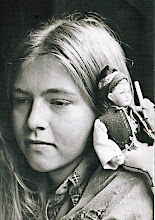The card was sent to Henry Fray in Seattle in 1910 from J.M.W. in Limestone, Maine. The message is a little hard to read, but here's what I could get from it (Note: Bsh indicates bushels). I love that it's a card sent by a Maine potato farmer:
Dear Fray we are all done digging spuds raised 5300. Bsh like the chap on the other side here at the home farm and 4000. Bsh on the farm that Ben is on. I am still making starch will probably be at it three weeks more. Wish I could come and make you a visit there. All well. J.M.W.
Even though the initials J.M.W. would not appear to provide a lot of information, Limestone is a pretty small place and there were only so many potato farmers. I believe that this card was written by J.M. Ward. In a 1916 publication on agricultural economics, J.M. Ward details the equipment needed for his potato farm.
Here's a great photo from Wikipedia, showing a potato caretaker's card. Because potatoes were so important, men were hired to take care of them on the trains and make sure the proper temperature was maintained in the cars. The pass allowed the 'potato caretakers' free train travel back home.









.tif)








I've seen the giant fruit cards before, but not one featuring the humble spud!
ReplyDeleteI guess given some initials, an address, and the right set of circumstances, it is possible to build a real history. I'm assuming they only used those heated boxcars in freezing temps, since taters usually like cool, dark places just fine.
ReplyDeleteWhy don't they still make those giant vegetable cards? I love 'em. And your research is great -- love the stories.
ReplyDeleteI am also a big fan of big fruit and vegetables. A darn shame they don't still make these, although I think Idaho still sells a giant potato postcard.
ReplyDeleteI think its is so interesting that they had potato caretakers. I would never have guessed.
ReplyDeleteI enjoyed the information about potato farming equipment and potato caretakers.
ReplyDelete